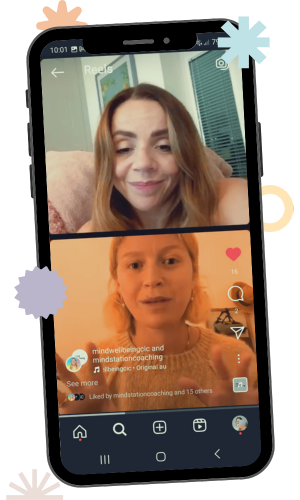How Childhood Beliefs Shape Adult Identities
The beliefs we form in childhood lay the foundation for how we see ourselves, interpret the world, and navigate relationships as adults. These deeply ingrained convictions, known as core beliefs, often develop without conscious awareness, yet they influence our thoughts, behaviours, and emotions throughout our lives. While positive beliefs can empower us, limiting beliefs - such as “I’m not good enough” - can hold us back, shaping adult identities in ways that may no longer serve us.
In a recent Instagram Live, Hannah from Mind Wellbeing CIC and Chloë from Mind Station explored the critical role core beliefs play in childhood and how they influence adult identities. By addressing these beliefs early, we can empower children to develop self-worth and resilience while equipping adults with the tools to reshape limiting patterns.
The Roots of Core Beliefs
Core beliefs are formed during the earliest stages of life, often solidifying by the age of seven. Hannah explained how they originate as sensations in the body during infancy. A baby whose needs are met consistently may develop a belief that the world is safe and trustworthy, whereas unmet needs can result in sensations of distress that evolve into limiting beliefs.
These early beliefs are reinforced through repetition and environmental cues:
Consistent Care: Positive experiences create neural pathways that support empowering beliefs, such as “I am loved” or “I am capable.”
Negative Patterns: Conversely, repeated feelings of neglect or criticism can lead to beliefs like “I am not important” or “I must be perfect to be accepted.”
Ripple Effect of Adult Beliefs: Parents and caregivers also unknowingly pass on their own limiting beliefs, shaping a child’s understanding of themselves and the world.
As Hannah highlighted, “Our beliefs are formed not just from our experiences, but from the stories we tell ourselves about those experiences.” For example, a child might internalise a teacher’s critical remark as evidence they are not smart, creating a belief that persists into adulthood.
From Childhood to Adulthood: The Lasting Impact
Chloë described how beliefs formed in childhood act as a mental “autopilot” in adulthood, driving behaviours and emotional responses. These beliefs can empower or disempower, depending on their nature:
Positive Beliefs: A child who grows up feeling loved and supported is likely to develop a strong sense of self, enabling them to navigate challenges with confidence.
Limiting Beliefs: Conversely, beliefs like “I’m not good enough” or “I have to be perfect to be loved” can lead to self-doubt, anxiety, and perfectionism in adulthood.
The difficulty lies in how our brains are wired. Once a belief is formed, the brain seeks evidence to support it, reinforcing the pattern over time. By adulthood, these beliefs can feel immovable, even if they no longer serve us.
The Power of Prevention
While changing core beliefs in adulthood is possible, it is far easier to shape positive beliefs during childhood. In the Live, Hannah emphasised the importance of preventative measures, noting that the earlier positive beliefs are instilled, the less reparative work is needed later. Key strategies include:
Affirmations and Connection: Using empowering phrases like “You are enough” and fostering strong connections help children build self-esteem.
Addressing Emotions: Teaching children that emotions are temporary sensations, not their identity, helps them navigate big feelings without forming disempowering beliefs.
Parental Awareness: Involving parents in this work ensures consistency between home and school, creating an environment where positive beliefs can flourish.
Hannah also pointed out that perfection is not the goal: “It’s not about the rupture; it’s about the repair.” If a child forms a limiting belief from a difficult moment, repair work - such as discussing feelings and reframing the narrative - can help reaffirm positive beliefs.
Changing Beliefs in Adulthood
For adults, reshaping core beliefs requires conscious effort. Hannah and Chloë shared insights into how beliefs formed in childhood can create challenges in adulthood, including self-doubt, fear of failure, and difficulty navigating relationships. However, with the right tools, beliefs can be changed.
Awareness: Identifying limiting beliefs is the first step. Adults can ask themselves, “What story am I telling myself, and is it true?”
Repetition: Small, consistent actions - such as practising affirmations or seeking evidence of positive beliefs - help create new neural pathways.
Support: Coaching, therapy, or guided programmes can provide the structure needed to challenge and change ingrained beliefs.
Hannah reflected on her personal experience, sharing how her belief that she had to be perfect to be loved drove her actions for years. “Negative beliefs can serve people in the short term,” she explained, “but they often come from fear rather than satisfaction. Reshaping those beliefs allows us to thrive instead of merely survive.”
Education as a Game-Changer
Both Hannah and Chloë emphasised the transformative potential of integrating belief-based education into school curriculums. Teaching children about the malleability of their beliefs and empowering them with tools like self-awareness and emotional regulation can set them up for a lifetime of resilience.
Chloë highlighted the impact of early interventions: “When children understand their minds and know they can shape their beliefs, they build a stronger sense of self and are better equipped to handle challenges.”
The beliefs we form as children shape the adults we become, influencing our identities, relationships, and emotional well-being. While it’s never too late to challenge limiting beliefs, the best foundation is built in childhood. By fostering environments where positive beliefs can thrive—through connection, education, and awareness—we can create a future where children grow into confident, resilient adults.
At Mind Wellbeing CIC, we believe in empowering children and adults alike to reimagine what’s possible. Together, we can break cycles, build stronger selves, and shape a brighter future.

